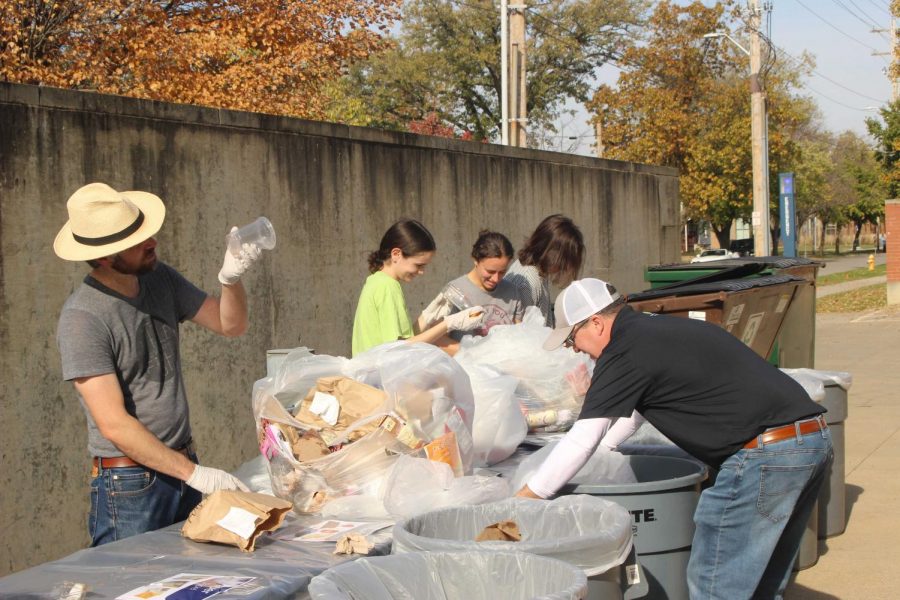Volunteers Dig Through Dumpsters for Campus Waste Audit
Students and volunteers sort through trash during a waste audit organized by the College throughout the week to determine future sustainability and recycling practices.
This week, volunteers riffled through dumpsters from six buildings around campus, sorting trash and potentially recoverable materials by hand to conduct a waste audit for the College. This assessment will help determine ways in which the College could potentially resume recycling, which was paused in March 2020 after the City of Oberlin suspended collection services due to COVID-19.
Reduction in Motion, a sustainability consulting company based in Maryland, coordinated the waste audit which took place from 9 a.m. to 6 p.m. this past Tuesday and Wednesday. By cataloging the number of compostables and various types of accepted recyclables, Reduction in Motion will determine best practices for the College to envision a sustainable waste management program.
According to Campus Energy & Resource Manager Joel Baetens, the City of Oberlin is requiring that the College undergo a waste characterization study to prove that the institution can reduce contamination.
“That would help [the College] understand what our waste streams are but also clean up our waste streams to get rid of any contamination, which we did have a lot of … in our previous waste streams,” Baetens said.
Additionally, with this study, Baetens hopes to identify other potential areas for waste reduction. After completing the characterization process at the first site, South Hall, Baetens says that the preliminary data reflects a huge potential for post-consumer compost.
“We’re doing a lot of pre-consumer compost right now,” he said. “Say chefs are cutting up onions, and they’re taking those onion peels. We’re collecting that right now, but we’re not getting anything after folks are getting their food. So, just for example, we found about a third of the waste stream in South [Hall] is compostable. It’s not being recovered.”
College fourth-year and Resource Conservation Team Student Intern Imani Badillo coordinated volunteers for the audit. Badillo suggested students feel empowered by participating in a solution and taking the question of waste management into their own hands.
“Hopefully by doing this — by taking more steps to be able to educate students and make students more aware about where their waste is going, the way that their waste is being used — it’ll also make students more aware of their impact,” Badillo said.
Baetens noted with dismay that many reusable dining boxes were recovered from dumpsters during the audit. Students often allow these reusable containers to pile up in their residential spaces, causing shortages and forcing dining halls to rely on expensive disposables. Rather than purchasing more containers or relying on single-use plastics when there are shortages, Baetens says that Campus Dining Services may start predominantly providing compostable containers in the future.
Badillo, who is also a teaching assistant for Environment and Society, the introductory Environmental Studies course, described a sense of frustration among first-year students in the class about the lack of recycling and post-consumer composting.
“There is no recycling or composting being done at this school and I think that it is very surprising for a historically progressive and environmentally aware institution,” wrote College first-year Peter Staub in an email to the Review.
However, according to Badillo, this waste audit is a step toward creating a functioning waste management program.
“I feel like this is definitely a good step to take and definitely a right step to take, even though it seems really slow,” Badillo said. “I think the biggest reason why the College stopped recycling was because there was so much contaminated recycling — it was almost all the recycling the College was trying to recycle.”
Staub is among a group of students who participated in the waste audit as part of a required community-based project for ENVS 101. However, Badillo said the waste audit was not necessarily the first choice of all of the students in the group.
“Honestly, based on the one session that I did today, people enjoyed it more than they were expecting to,” they said. “It definitely wasn’t as gross as I was expecting it to be. I was expecting it to be very smelly and not very fun, but it was interesting. People seemed really interested in seeing how the sorting process worked.”
Cool-weather, clear skies, and a shared sense of purpose contributed to the positive attitude of volunteers as they weighed and sorted the contents of each dumpster. The waste was separated into bins for corrugated cardboard, metal, plastics No. 1 and 2, paper, compost, and trash.
“With enough awareness in this community, a change can be made to the very unsustainable system we have,” Staub wrote. “In the loading dock of the Science Center alone, 20% of the waste could have been composted. With information like this, change within the City and College is very possible if action is taken.”







